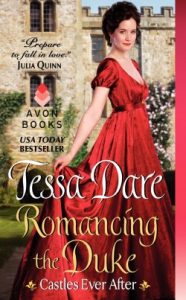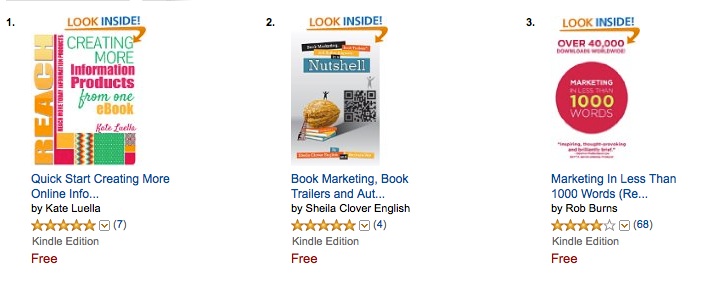
Hi and welcome to my first blog here at Reader’s Entertainment. A lot of you know me as a contributing editor at Publishers Weekly Magazine, speaker, interviewer, reader luncheon organizer, mother of 2 and grandmother of 2. But, even though I have been an avid reader for years, I never thought I’d become an author. Don’t look for my books in the fiction section. I’ve done two non-fiction books and Book Marketing, Book Trailers and Author Etiquette in a Nutshell, co-authored with Sheila Clover English, is now free on Amazon and has amazingly jumped to the #2 position. I never saw this coming.
Now, you’re all welcome to go over and download the book, but I wanted to tell you what writing this book turned me into. I find myself going over to Amazon page hourly to check to see what our status is. I’ve read all the reviews (all 5 stars, so far, thank you very much) and now I’ve discovered that people can highlight certain sections.
Leigh Ann took a section where we asked authors some tough questions they get from readers and this dealt with,
James Rollins: What? I simply trust spellcheck to make sure a book is error-free. Okay, maybe not. But I can tell you where most mistakes appear in my books. It’s when I think I know something and I really don’t. We all have a certain knowledge base in our head that we believe to be foolproof: the capital city of Illinois is Chicago (it’s not…it’s Springfield); that any pistol can be equipped with a silencer (they can’t); that the appendix is on the left side of the body (nope, the right). So those errors creep into a book because I’m so sure I’m right that I don’t research that specific detail. And unfortunately, those mistakes often slip past my editor and copy-editor, too. But from all the emails, Facebook entries, Tweets, and Amazon reviews that follow, apparently everyone else knows the appendix is on the right side of the body.
Jade Lee: There are so many steps in the publication process, that errors get introduced all over the place. We try to make it the best possible book—everyone from the author through three different editors/copy editors, and the printer who may also check the manuscript. But sadly, errors get introduced—or not caught—all the time. Hopefully it’s a good story despite the errors.
Andrew Peterson: I try to do a thorough job of editing, but by the time I’m finished with a manuscript, I’m sick to death of it. I’m ready to drop-kick it across the room and watch all 400 pages flutter through the air. There comes a point where you have to stop editing and abandon it. The good thing about ebooks is that you get a second chance to fix things you missed in the original release.
MJ Rose: I’m a writer and not an editor. I wish I was both — very few of us are. I’m so deep inside the book and the characters and the story that I don’t have the kind of distance from it that an editor needs to have. Plus I’m dyslexic and my eye corrects mistakes that my fingers have made. I do apologize. One of my books is read at least 5 times by a different kinds.
A tough subject answered honestly.
Another reader, JoAnn, highlighted a quote she liked:
“Anytime you come across as desperate to sell your book, it devalues the book.”
I love this one too and it’s so true.
Anyway, I’m going to close the Amazon section for a while and read a really good fiction book because those are my favorite!
 .
.
.
In honor of my first post, Reader’s Entertainment is giving away Tessa Dare’s Romancing the Duke. It’s a terrific book and I know because I read it already!! Just leave the comment, “Welcome!” A winner will be announced on Monday.








